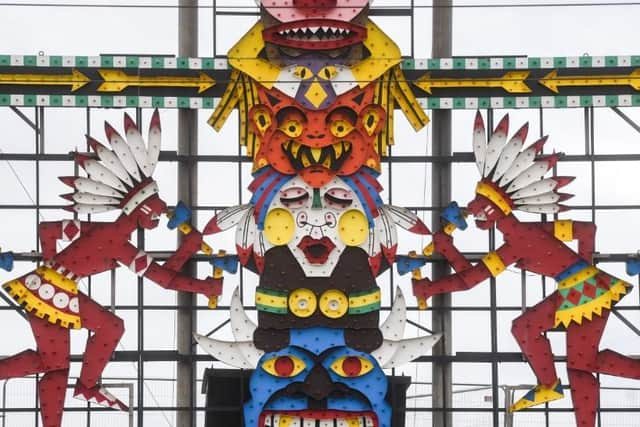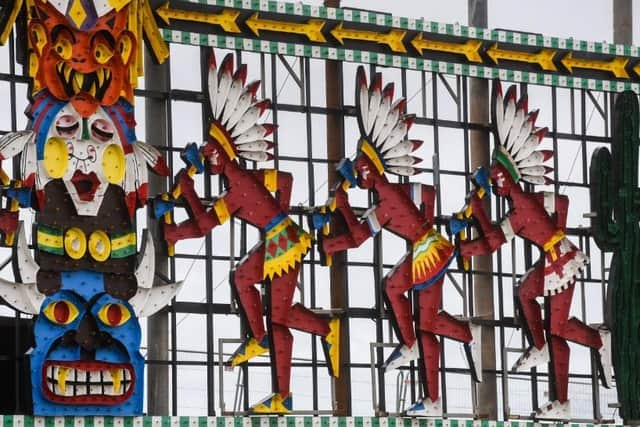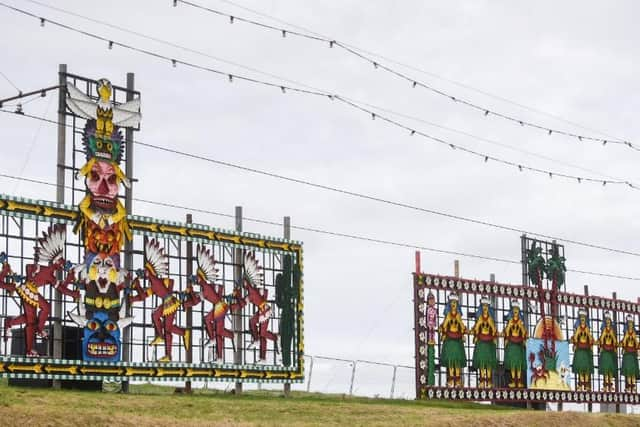'Red Indian' lights display "paints Blackpool as a community that supports racism and discrimination"
and live on Freeview channel 276
Blackpool Council defended the resort’s inclusion of allegedly racist imagery in its famous Illuminations following complaints from a member of the Chickasaw Nation, living in England.
The offending tableau, located north of Blackpool Promenade near the junction of Cavendish Road, Bispham, depicts six axe-wielding Native Americans in war bonnets dancing around a totem pole. The man said it reinforced racial stereotypes.
Advertisement
Hide AdAdvertisement
Hide AdA council spokesman said the lights were ‘were designed and created many years ago and intended to be a celebration of different cultures’ - but added that their continued use in upcoming years would be addressed.


In a letter shared with The Gazette, the Chickasaw Nation man, who met with council bosses yesterday to discuss the lights, said: “Caricatures such as these reinforce racial stereotypes of Native Americans as being primitive people who have no place in modern society. Research has shown that caricatures like these have harmed Native youth by lowering self-esteem and increasing depression and rates of self-harm and substance abuse. It has also increased discrimination against Native students.”
He added: “This is not the approach I would expect from a community whose Council unanimously supported a resolution to ‘confirm support for the anti-racist aims of Black Lives Matter and other anti-racism campaigns.’. Between now and January 2022, the night sky of Blackpool will beam a very different message until this exhibit is removed or concealed.
“Showing - let alone promoting - such illuminations also does little to promote Blackpool as a welcoming community. Instead, it paints Blackpool as a community that supports racism and discrimination. It doesn’t reflect the difficult conversations and changing societal values on race that we’ve seen since the Black Lives Matter protests that sparked your resolution. Worse still, these illuminations are seen by hundreds of thousands of people each year, which means that they spread stereotypes to other communities in the UK and beyond.
Advertisement
Hide AdAdvertisement
Hide Ad“Finally, it shows limited awareness of the contributions that Native people have played in British history. In fact, several warriors from my own tribe, the Chickasaw Nation, passed through nearby Preston with an English regiment in the Jacobite Rebellion in 1745. It also fails to recognise that we aren’t people of the past; we have endured, despite the odds, we persist and we thrive. We also are among the migrants who have found a home in global Britain.


“I would not expect such an exhibit to stand if it contained caricatures of Black, Asian or other peoples of colour; nor should it stand if it contains caricatures of the first peoples of the United States and Canada.”
Stereotypical portrayals of Native Americans and Canadians, historically a popular choice of mascot for sports teams, have been phased out in recent years following criticism from anti-racism campaigners.
Last year, Exeter Chiefs axed their culturally offensive ‘Big Chief’ mascot, replacing it with a hawk called Tom.
Advertisement
Hide AdAdvertisement
Hide AdNumerous American football and baseball teams also rebranded themselves. In July 2020, the Washington Redskins team was renamed the Washington Football Team following years of protests over the name, which is a derogatory term for Native Americans. Five months later, the Cleveland Indians team followed suit and was renamed the Cleveland Guardians.


In 2006 the Texas-based Midwestern State University Indians became the Mustangs to ‘eliminate the potential for a hostile or abusive environment’. In 2007 the University of Illinois dropped its ‘Chief Illiniwek’ logo and mascot, and in 2008 the Arkansas State University changed its mascot from an axe-wielding ‘Indian’ to a red wolf.
Councillor Tony Williams, who was among a long list of councillors to be contacted, said: “Some of these displays go back to the 60s when attitudes and perspectives were much different and the writer has raised some valid points.
“Several Western-themed films have been banned in the US for the very reasons stated. Whilst in themselves the displays may not be offensive they certainly portray a distorted view of Native Americans and their culture.”
Advertisement
Hide AdAdvertisement
Hide AdA Blackpool Council spokesman said: “Our officers have been in constructive discussion with two people of Native American origin who raised concerns about the tableau.
“We have explained the background to the historic elements of the Illuminations display and assured them that these were designed and created many years ago and intended to be a celebration of different cultures. Both have accepted that assurance.
“The Illuminations are one of the UK’s most enduring family attractions and we would never do anything intended to cause offence. We will, as a matter of course, take on board the comments received and review which features are appropriate for inclusion in next year’s display. We have also agreed to explore options for a new tableau that celebrates native American culture with input from the network based in the UK.”
Criticism of the 'red Indian' stereotype
Popular criticism of Native American caricatures dates all the way back to the 1960s, the same decade the Illuminations display was first put on show. Indigenous peoples and their supporters increasingly objected to the stereotypes, which they found offensive.
Advertisement
Hide AdAdvertisement
Hide AdArguments continue to be made about the use of Native American and Canadian cultures as a source of entertainment. Chieftains were once popular choices for sports team mascots, while ‘Red Indian’ themed Halloween costumes can still be purchased in some fancy dress shops.
These things, activists say, perpetuate harmful ethnic stereotypes about Native Americans, portraying them either as fierce warriors or ‘noble savages’.
Professor Phillip Deloria, of the Arab American National Museum, said: “After colonisation and conquest of American Indian people was complete, the older stereotypes of Indian stereotypes and violence really gave way to the much more placid, friendly kind of stereotypes about Indians being natural primitives. And that primitive kind of Indian was no longer savage but had all kinds of virtues that people wanted to appropriate and adopt for themselves.
“There’s a new kind of savagery. It’s no longer the savagery of being an Indian who’s out on the frontier who will kill you, it’s the savagery of being contaminated by modern society. Those old Indians who would scalp you at a moment’s notice give way to a new Indian savage who is the drunk in the street, who has been corrupted by American society.”
Advertisement
Hide AdAdvertisement
Hide AdHe added: “You can see a stereotype taking shape as a big cultural ideology - a set of expectations about what Indian people or other people are going to do, how they’re going to behave, how they live their lives. That makes its way into the cultural infrastructure that just seeps its way into all of our minds and our hearts and our souls. It’s an ideology.”
Comment Guidelines
National World encourages reader discussion on our stories. User feedback, insights and back-and-forth exchanges add a rich layer of context to reporting. Please review our Community Guidelines before commenting.